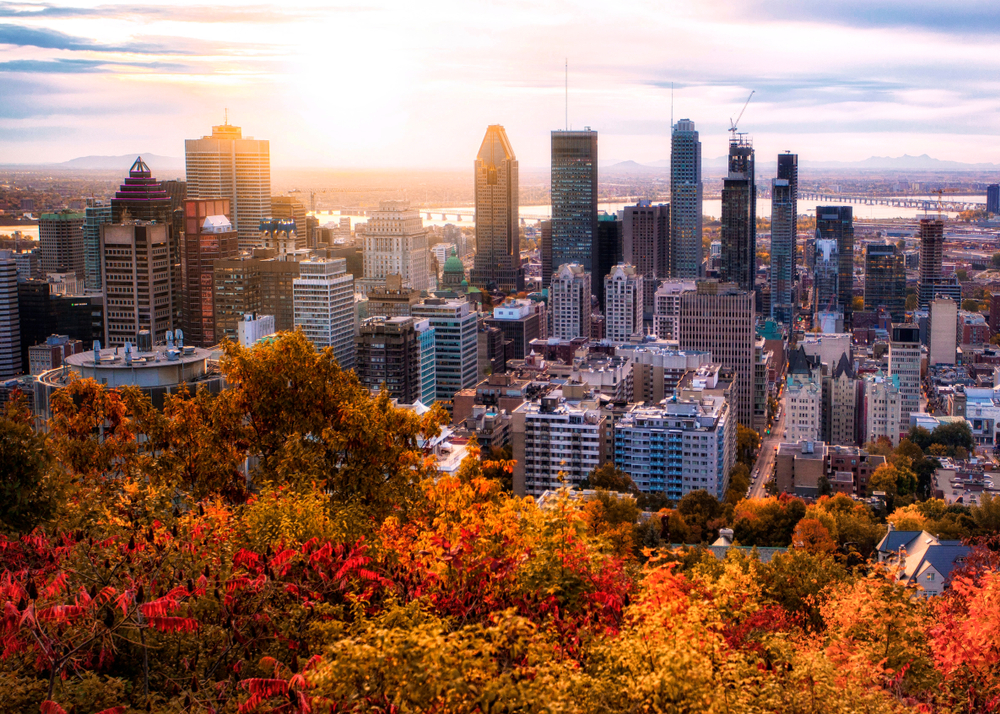
History of Montreal
Though it’s most known for its French heritage, it was St. Lawrence Iroquoians who first inhabited modern-day Montreal. These indigenous people enjoyed the site’s ample natural resources, including the St. Lawrence River. French navigator Jacques Cartier first stopped in the settlement in 1535, encountering a population that exceeded 1,000 people. But by 1603, when another French explorer—Samuel de Champlain—made landfall, the natives had disappeared due to disease. Champlain would play a pivotal part in the island’s development, establishing the first fur trading post in 1611 and dubbing it “Lille de Villemenon.”
But by 1639, Jérôme Le Royer de La Dauversière laid claim to the island, soon hiring Paul Chomedey de Maisonneuve to help build a mission. “Ville-Marie,” or “City of Mary” was founded in 1642 with Maisonneuve serving as the first governor. Though it was the target of repeated attacks by Iroquois raids, the settlement defied the odds and survived. Continued fighting and turnover of ownership took place in the decades to come with the French colony surrendering to Great Britain around 1760.
Now renamed after a small extinct volcano dubbed Monte Real, Montreal was incorporated as a city in 1832, and by 1860 had become the largest municipality in British North America. Expansion to the St. Lawrence canal and the deepening of the channel to Quebec City enabled Montreal to become a significant seaport, while simultaneously serving as a railway hub. This type of newfound access empowered the city to become much more than just a place for traders. It was becoming a major industrial centre.
World War I stimulated a period of growth for the city, but the Great Depression would soon bring that expansion to a halt as the city went into debt and was placed under trusteeship by the government. Eventually, the development of World War II helped to restore prominence to the city. Montreal would go on to serve as host for the World’s Fair in 1967 and the Olympics in 1976.
Most recently, Montreal has received international acclaim for being a centre of economic and cultural greatness, and one of the gems of North America.
Entertainment/things to do in Montreal
With a city as big and bustling as Montreal, the entertainment and attraction options are nearly endless. One of the favourites of both locals and visitors is strolling through Old Montreal and admiring the historic neighbourhoods spectacular architecture that has structures dating back to the 17th century. Be sure to stop by Place d’Armes, one of the oldest sites in all of Montreal, and visit Notre-Dame Basilica with its elaborate carvings and 7,000-pipe organ.
Mount Royal Park, or Parc Mont-Royal, draws some 5 million visitors who come to experience its vast outdoor wonderland. The park has 470 acres and provides stunning skyline views from the top of the mountain’s three peaks. In addition to checking out the scenery, visitors can ice skate, hike, picnic, run, bike and row a boat on the lake, depending on the season.
If you’re looking for activities that you can do in Montreal year-round, the Montreal Biodome is a fun option for people of all ages. This indoor nature exhibit has more than 250,000 animals and 500 plant species. Other indoor hot spots include the Montreal Science Center, with its Telus IMAX theatre, and the Museum of Fine Arts, the largest art museum in all of Canada when ranked by gallery space.
Additionally, the Bourgie Concert Hall is a 462-seat concert hall with three grand pianos, two harpsichords, a clavicytherium and a grand chamber organ. Concerts range in genre from classical to jazz, contemporary to world culture. The city has tons of great shopping, but some of the most unique experiences take place in The Underground City, a series of interconnected towers and stores that allow guests to shop until they drop without ever having to step foot outside.
Between the city’s assortment of outdoor festivals, abundant nightlife choices and delectable restaurants, there’s a little something for everyone.
The Montreal economy and what you need to know about moving there
Montreal’s economy is one of the top producing in all of Canada and is considered an important player in the commerce, finance, culture, and technology industries on a global stage.
The Montreal Exchange, formerly known as the Montreal Stock Exchange, an exchange that trades futures contracts and options, is located in Montreal. Its presence, which first dates back to the 1800s, is a major coup for the city. Finance alone is thought to employ about 100,000 people in the greater Montreal area.
Other industries that have seen either new growth or revitalization in Montreal include film and television production and video game development. In addition, the Montreal Oil Refining Centre is the largest in all of Canada.
The city makes up the second-largest media market in the country, with four over-the-air English-language TV stations, five over-the-air French-language TV stations and three daily newspapers. Montreal’s Pierre Elliott Trudeau International Airport is an international passenger airport that serves as the headquarters for Air Canada and Air Transat.
Rail service to other Canadian cities is available on the Montreal-based Via Rail. Within the city, there’s an extensive public transit city that consists of a busy network of buses, subways and commuter trains.






